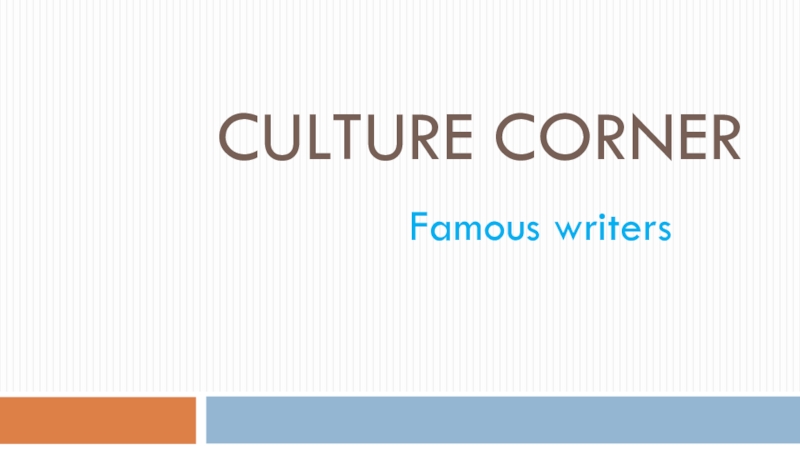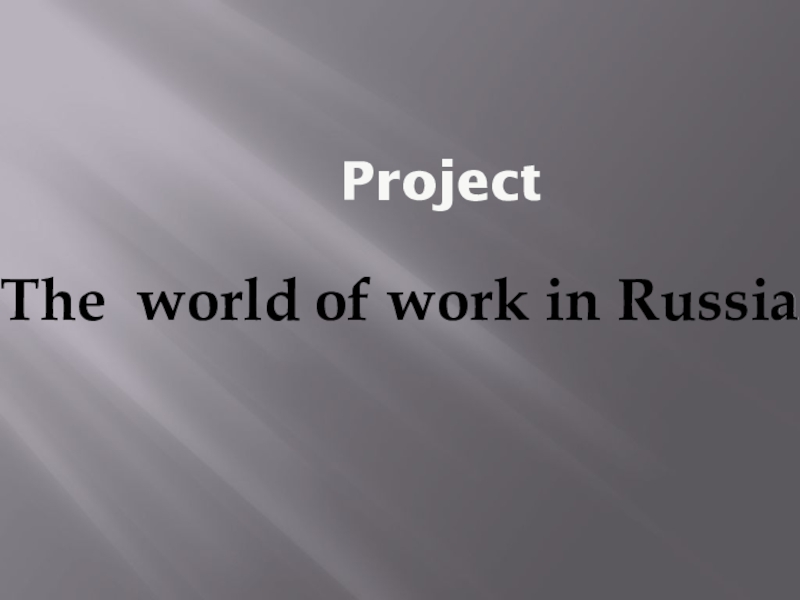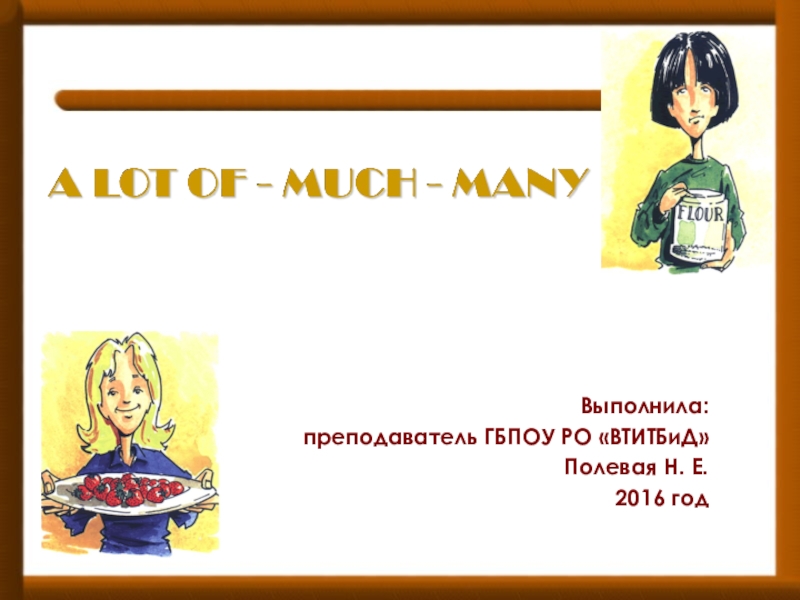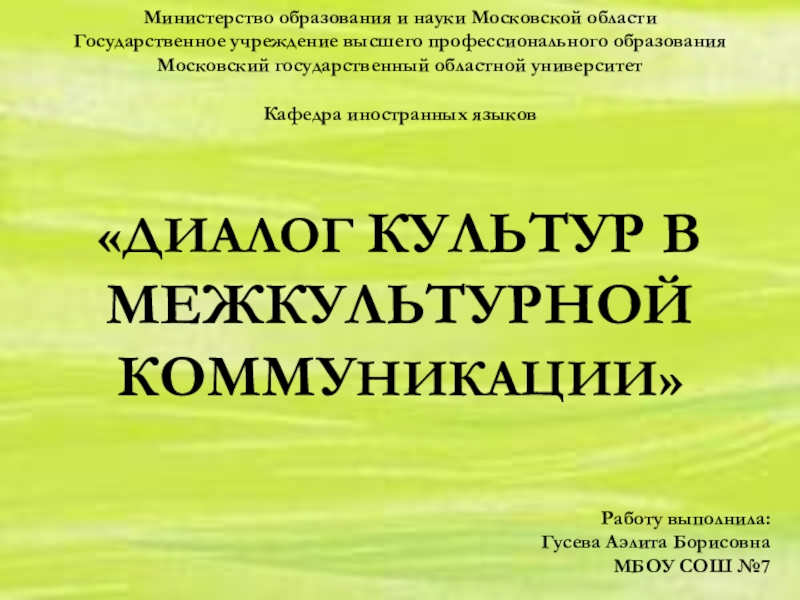- Главная
- Разное
- Образование
- Спорт
- Естествознание
- Природоведение
- Религиоведение
- Французский язык
- Черчение
- Английский язык
- Астрономия
- Алгебра
- Биология
- География
- Геометрия
- Детские презентации
- Информатика
- История
- Литература
- Математика
- Музыка
- МХК
- Немецкий язык
- ОБЖ
- Обществознание
- Окружающий мир
- Педагогика
- Русский язык
- Технология
- Физика
- Философия
- Химия
- Шаблоны, фоны, картинки для презентаций
- Экология
- Экономика
Презентация, доклад на тему :Primary education in Russia
Содержание
- 1. :Primary education in Russia
- 2. Primary [ˈpraɪmeri] первичный,
- 3. Middle
- 4. State
- 5. Primary education in RussiaEducation plays a very
- 6. The children and their parents can choose
- 7. Children have also lessons of Handicrafts, Draw,
- 8. The educational system consists:of preschool, General secondary, secondary special, professional education.
- 9. Preschool education in Russia — education, training
- 10. Primary education is the first stage of
- 11. The main task of General education is
- 12. Objectives of secondary (complete) General education are
- 13. Higher education — higher level vocational education
- 14. Vocational education— a system of training skilled
- 15. Контроль знания лексики
- 16. НачальныйОбразованиеДошкольныйСреднийЦенныйРольЧетвертьОбязательныйВажныйPrimary [ˈpraɪmeri]Education [edjuˈkeɪʃn]Preschool [ˈpriːskuːl]Secondary [ˈsɛk(ə)nd(ə)ri]Valuable
- 17. СреднийСтаршийПодвергатьДетские яслиДетскаяКлассШирокийФиксироватьВыбиратьMiddle [ˈmɪdl]Senior [ˈsiːnɪə]Subject
- 18. ЛицейГосударственныйПоследнийОсновыПоведениеВключатьВо времяЗащитаГимназияLyceum [ lаɪˈsiːəm ]State [
- 19. THE END
Primary [ˈpraɪmeri] первичный, основной, начальныйEducation [edjuˈkeɪʃn] образование, образованность, обучениеImportant [ɪmˈpɔːt(ə)nt] важный, значительный, существенныйRole [rəʊl] рольValuable
Слайд 2Primary [ˈpraɪmeri] первичный, основной, начальный
Education
[edjuˈkeɪʃn] образование, образованность, обучение
Important [ɪmˈpɔːt(ə)nt] важный, значительный, существенный
Role [rəʊl] роль
Valuable [ˈvaljʊb(ə)l] ценный, полезный, дорогой
Possession [pəˈzeʃn] владение, обладание
Preschool [ˈpriːskuːl] дошкольный
Attend [əˈtend] посещать, присутствовать, ходить
Secondary [ˈsɛk(ə)nd(ə)ri] вторичный, средний, второй
Compulsory [kəmˈpʌlsəri] обязательный, принудительный
Term [tɜːm] четверть, срок, термин, называть
Elementary [elɪˈmentri] элементарный, начальный, простой
Important [ɪmˈpɔːt(ə)nt] важный, значительный, существенный
Role [rəʊl] роль
Valuable [ˈvaljʊb(ə)l] ценный, полезный, дорогой
Possession [pəˈzeʃn] владение, обладание
Preschool [ˈpriːskuːl] дошкольный
Attend [əˈtend] посещать, присутствовать, ходить
Secondary [ˈsɛk(ə)nd(ə)ri] вторичный, средний, второй
Compulsory [kəmˈpʌlsəri] обязательный, принудительный
Term [tɜːm] четверть, срок, термин, называть
Elementary [elɪˈmentri] элементарный, начальный, простой
Слайд 3Middle [ˈmɪdl] средний, середина, талия
Senior
[ˈsiːnɪə] старший, выпускной, последний
Grade [ˈɡreɪd] класс, ранг, сорт, оценка
is divided [ iz dɪˈvaɪdəd] раздел, разделение, дележ
Fixed [fɪkst] фиксировать, исправлять
Means [ miːnz ] означает, средства, способ
Choose [tʃuːz] выбирать, хотеть, избирать
Subject [ˈsʌbdʒɪkt] подвергать, подчинять, тема
Crèche [ kreʃ ] детские ясли
Nursery [ˈnɜːsəri ] детский сад, ясли, детская комната
Wide [ waɪd] широкий, большой, обширный
Choice [ tʃɔɪs ] выбор, отбор, альтернатива
Grade [ˈɡreɪd] класс, ранг, сорт, оценка
is divided [ iz dɪˈvaɪdəd] раздел, разделение, дележ
Fixed [fɪkst] фиксировать, исправлять
Means [ miːnz ] означает, средства, способ
Choose [tʃuːz] выбирать, хотеть, избирать
Subject [ˈsʌbdʒɪkt] подвергать, подчинять, тема
Crèche [ kreʃ ] детские ясли
Nursery [ˈnɜːsəri ] детский сад, ясли, детская комната
Wide [ waɪd] широкий, большой, обширный
Choice [ tʃɔɪs ] выбор, отбор, альтернатива
Слайд 4State [ steɪt ] государственный,
состояние, государство
Lyceum [ lаɪˈsiːəm ] лицей, лекторий
Gymnasiums [ dʒɪmˈneɪzɪəm ] гимназия, спортзал
Count [kaʊnt] счёт, подсчёт
last [lɑːst ] последний, прошлый, длиться
During [ˈdjʊərɪŋ] во время, в течение
Includе [ɪnˈkluːd] включать, заключать, содержать в себе
Fundamentals [ fʌndəˈmentəlz ] основы, основные принципы
Security [sɪˈkjʊərɪti] защита, охрана, надежность
Others [ ˈʌðə (r)s] другой, остальные
Conduct [kənˈdʌkt ] поведение, руководство, управление
Lyceum [ lаɪˈsiːəm ] лицей, лекторий
Gymnasiums [ dʒɪmˈneɪzɪəm ] гимназия, спортзал
Count [kaʊnt] счёт, подсчёт
last [lɑːst ] последний, прошлый, длиться
During [ˈdjʊərɪŋ] во время, в течение
Includе [ɪnˈkluːd] включать, заключать, содержать в себе
Fundamentals [ fʌndəˈmentəlz ] основы, основные принципы
Security [sɪˈkjʊərɪti] защита, охрана, надежность
Others [ ˈʌðə (r)s] другой, остальные
Conduct [kənˈdʌkt ] поведение, руководство, управление
Слайд 5
Primary education in Russia
Education plays a very important role in our
life. It is one of the most valuable possessions that a man can get in his life.
The literacy rate in Russia is almost 100%. Half of Russia’s adults has at least college education. So Russia has the highest college-level education in the world.
Russia has pre-school educational system. About 2/3 of children aged 5 attend kindergartens. Since the age of 6 or 7 children attend school. Eleven-year secondary education in Russia is compulsory. School term has 3 stages: elementary (grades 1-4), middle (grades 5-9) and senior (grades 10-11) classes.
The school year starts in September 1 and finishes in May. It is divided into four terms. Study programme in schools is fixed. It means that schoolchildren can’t choose subjects they want to study.
Currently there are different types of schools in Russia.
The literacy rate in Russia is almost 100%. Half of Russia’s adults has at least college education. So Russia has the highest college-level education in the world.
Russia has pre-school educational system. About 2/3 of children aged 5 attend kindergartens. Since the age of 6 or 7 children attend school. Eleven-year secondary education in Russia is compulsory. School term has 3 stages: elementary (grades 1-4), middle (grades 5-9) and senior (grades 10-11) classes.
The school year starts in September 1 and finishes in May. It is divided into four terms. Study programme in schools is fixed. It means that schoolchildren can’t choose subjects they want to study.
Currently there are different types of schools in Russia.
Слайд 6The children and their parents can choose a regular school, a
school with advanced study of some subject, a private school. Private schools in Russia are always fee paying.
Children start school at the age of six in Russia. The course of studies at school is eleven years now: four years of primary school and seven years of secondary school. Children under the age of six are taken to crèche and nursery schools. There is a wide choice of schools nowadays: state schools, private schools, lyceums and gymnasiums. The majority of schools is free of charge, but in some (usually private ones) parents have to pay for the education of their children. In ordinary schools parents sometimes pay for additional subjects in the curriculum, such as a foreign language or arts. In primary school there are three or four lessons a day, they usually are Reading, Writing and Arithmetic. It means they learn to count, to read and to write. A lesson lasts forty minutes. During the first term children get used to learning and adapt to school regulations.
Children start school at the age of six in Russia. The course of studies at school is eleven years now: four years of primary school and seven years of secondary school. Children under the age of six are taken to crèche and nursery schools. There is a wide choice of schools nowadays: state schools, private schools, lyceums and gymnasiums. The majority of schools is free of charge, but in some (usually private ones) parents have to pay for the education of their children. In ordinary schools parents sometimes pay for additional subjects in the curriculum, such as a foreign language or arts. In primary school there are three or four lessons a day, they usually are Reading, Writing and Arithmetic. It means they learn to count, to read and to write. A lesson lasts forty minutes. During the first term children get used to learning and adapt to school regulations.
Слайд 7Children have also lessons of Handicrafts, Draw, Music and Physical training.
In second, third and fourth years study includes such lessons as: World History of Arts, Fundamentals of Security, History, Geography, and others. At primary schools all lessons are usually conducted by one teacher. At the age of ten children pass to the second stage of education, known as secondary school. The transition from primary to secondary school is sometimes difficult for children.
After graduating from school or college our young people can enter universities or institutes, where they get higher education.
After graduating from school or college our young people can enter universities or institutes, where they get higher education.
Слайд 8The educational system consists:
of preschool,
General secondary,
secondary special,
professional education.
Слайд 9Preschool education in Russia — education, training and development, as well
as the supervision, care and rehabilitation of children of preschool age from 2 months to 7 years.
Preschool education is provided, as a rule, in institutions of preschool education institutions General education (kindergarten), institutions of additional education of children (centers and associations of early development), but can also be done at home in the family.
Слайд 10Primary education is the first stage of General education of children.
Receiving primary education, children gain their first knowledge about the world, skills in communication and solving of applied problems. At this stage personality of a child is formed and starts to develop, which emphasizes its importance to society and the state.
In the Russian Federation General primary education is compulsory and available to the public.
Слайд 11The main task of General education is the creation of conditions
for education, development and formation of student's personality, to develop his or her aptitudes, interests and abilities to social determination. Basic General education is the base for obtaining secondary (complete) General education, primary and secondary vocational education.
Слайд 12Objectives of secondary (complete) General education are the development of interest
in learning and creative abilities of students, formation of skills of independent educational activity on the basis of differentiation of study.
Слайд 13Higher education — higher level vocational education after General secondary. Includes
an aggregate of systematized knowledge and practical skills .The term "higher education" refers to the training of highly qualified specialists for various sectors of the economy, science, technology and culture in different types of high schools.
Слайд 14Vocational education— a system of training skilled workers in vocational schools,
as well as through learning at work.
Primary and secondary professional education is one of the key vectors of modernization of the whole educational system in modern Russia.
Слайд 16Начальный
Образование
Дошкольный
Средний
Ценный
Роль
Четверть
Обязательный
Важный
Primary [ˈpraɪmeri]
Education [edjuˈkeɪʃn]
Preschool [ˈpriːskuːl]
Secondary [ˈsɛk(ə)nd(ə)ri]
Valuable [ˈvaljʊb(ə)l]
Role
[rəʊl]
Term [tɜːm]
Compulsory [kəmˈpʌlsəri]
Important [ɪmˈpɔːt(ə)nt]
Term [tɜːm]
Compulsory [kəmˈpʌlsəri]
Important [ɪmˈpɔːt(ə)nt]
Слайд 17Средний
Старший
Подвергать
Детские ясли
Детская
Класс
Широкий
Фиксировать
Выбирать
Middle [ˈmɪdl]
Senior [ˈsiːnɪə]
Subject [ˈsʌbdʒɪkt]
Crèche [ kreʃ
]
Nursery [ˈnɜːrsəri ]
Grades [ˈɡreɪdz]
Wide [ waɪd]
Fixed [fɪkst]
Choose [tʃuːz]
Nursery [ˈnɜːrsəri ]
Grades [ˈɡreɪdz]
Wide [ waɪd]
Fixed [fɪkst]
Choose [tʃuːz]
Слайд 18Лицей
Государственный
Последний
Основы
Поведение
Включать
Во время
Защита
Гимназия
Lyceum [ lаɪˈsiːəm ]
State [ steɪt ]
last [lɑːst ]
Fundamentals
[ fʌndəˈmentəlz ]
Conduct [kənˈdʌkt ]
Includе [ɪnˈkluːd]
During [ˈdjʊərɪŋ]
Security [sɪˈkjʊərɪti]
Gymnasiums [ dʒɪmˈneɪzɪəm ]
Conduct [kənˈdʌkt ]
Includе [ɪnˈkluːd]
During [ˈdjʊərɪŋ]
Security [sɪˈkjʊərɪti]
Gymnasiums [ dʒɪmˈneɪzɪəm ]

![:Primary education in Russia Primary [ˈpraɪmeri] первичный, основной, начальныйEducation [edjuˈkeɪʃn] образование, образованность, Primary [ˈpraɪmeri] первичный, основной, начальныйEducation [edjuˈkeɪʃn] образование, образованность, обучениеImportant](/img/tmb/5/499328/f19039b580dcce8f8cecc0c7ff217a17-800x.jpg)
![:Primary education in Russia Middle [ˈmɪdl] средний, середина, талияSenior [ˈsiːnɪə] Middle [ˈmɪdl] средний, середина, талияSenior [ˈsiːnɪə] старший,](/img/thumbs/96d5a4f5c749e87f97031c6e11c97722-800x.jpg)
![:Primary education in Russia State [ steɪt ] государственный, состояние, государствоLyceum State [ steɪt ] государственный, состояние, государствоLyceum](/img/tmb/5/499328/45299e0f59c8bac8889a3d47d9bfd36a-800x.jpg)











![:Primary education in Russia НачальныйОбразованиеДошкольныйСреднийЦенныйРольЧетвертьОбязательныйВажныйPrimary [ˈpraɪmeri]Education [edjuˈkeɪʃn]Preschool [ˈpriːskuːl]Secondary [ˈsɛk(ə)nd(ə)ri]Valuable [ˈvaljʊb(ə)l] Role [rəʊl]Term [tɜːm]Compulsory [kəmˈpʌlsəri]Important [ɪmˈpɔːt(ə)nt] НачальныйОбразованиеДошкольныйСреднийЦенныйРольЧетвертьОбязательныйВажныйPrimary [ˈpraɪmeri]Education [edjuˈkeɪʃn]Preschool [ˈpriːskuːl]Secondary [ˈsɛk(ə)nd(ə)ri]Valuable [ˈvaljʊb(ə)l] Role [rəʊl]Term [tɜːm]Compulsory [kəmˈpʌlsəri]Important](/img/thumbs/d980689eb7995ffb2ba759cab9b3fcdf-800x.jpg)
![:Primary education in Russia СреднийСтаршийПодвергатьДетские яслиДетскаяКлассШирокийФиксироватьВыбиратьMiddle [ˈmɪdl]Senior [ˈsiːnɪə]Subject [ˈsʌbdʒɪkt]Crèche [ kreʃ ]Nursery [ˈnɜːrsəri ]Grades [ˈɡreɪdz]Wide [ waɪd]Fixed [fɪkst]Choose [tʃuːz] СреднийСтаршийПодвергатьДетские яслиДетскаяКлассШирокийФиксироватьВыбиратьMiddle [ˈmɪdl]Senior [ˈsiːnɪə]Subject [ˈsʌbdʒɪkt]Crèche [ kreʃ ]Nursery [ˈnɜːrsəri ]Grades [ˈɡreɪdz]Wide](/img/thumbs/7a08266243209ff5c0b735c201cc76a9-800x.jpg)
![:Primary education in Russia ЛицейГосударственныйПоследнийОсновыПоведениеВключатьВо времяЗащитаГимназияLyceum [ lаɪˈsiːəm ]State [ steɪt ]last [lɑːst ]Fundamentals [ ЛицейГосударственныйПоследнийОсновыПоведениеВключатьВо времяЗащитаГимназияLyceum [ lаɪˈsiːəm ]State [ steɪt ]last [lɑːst ]Fundamentals [ fʌndəˈmentəlz ]Conduct [kənˈdʌkt](/img/thumbs/3bc6b677208da0b489253b317463929d-800x.jpg)






